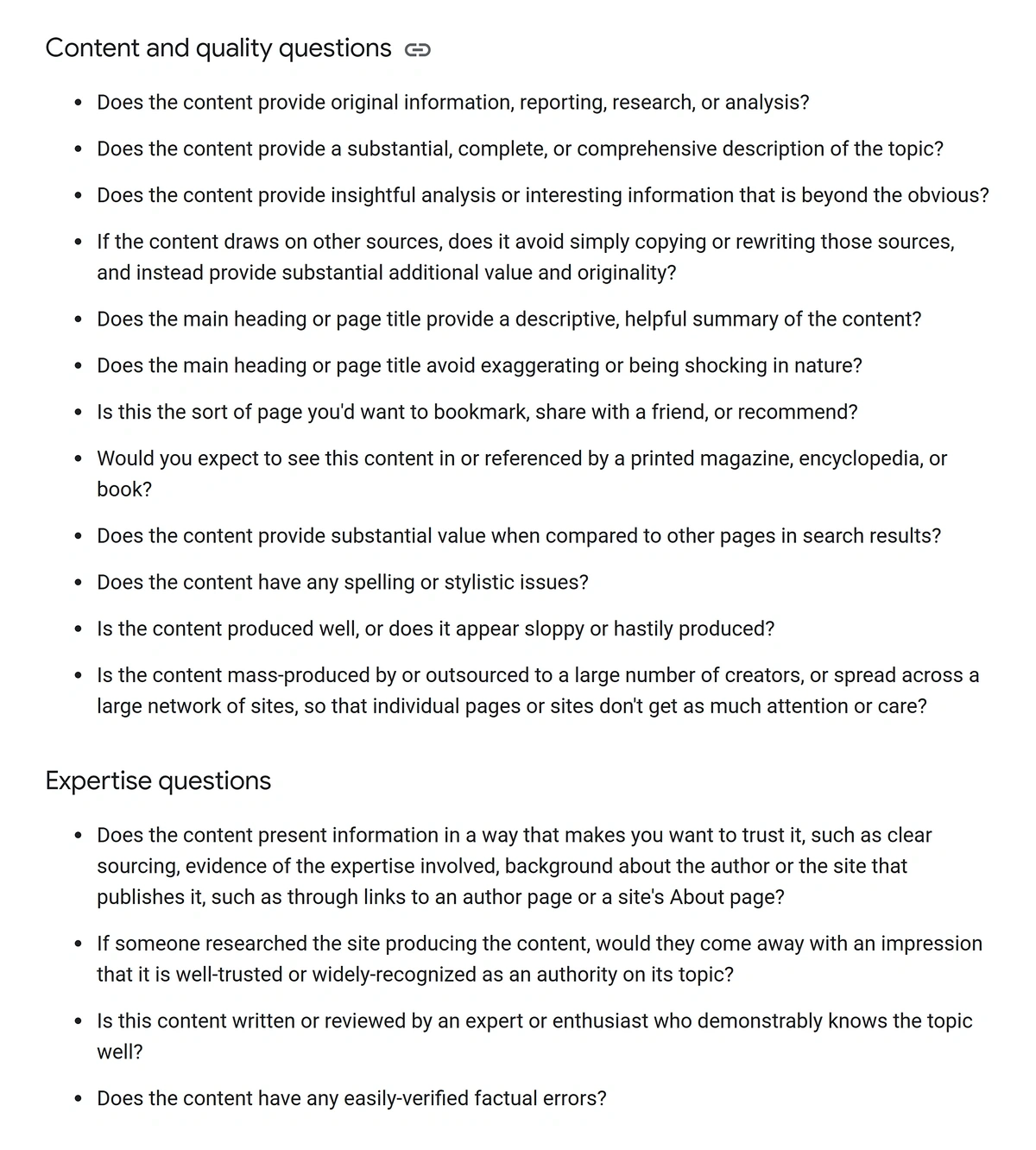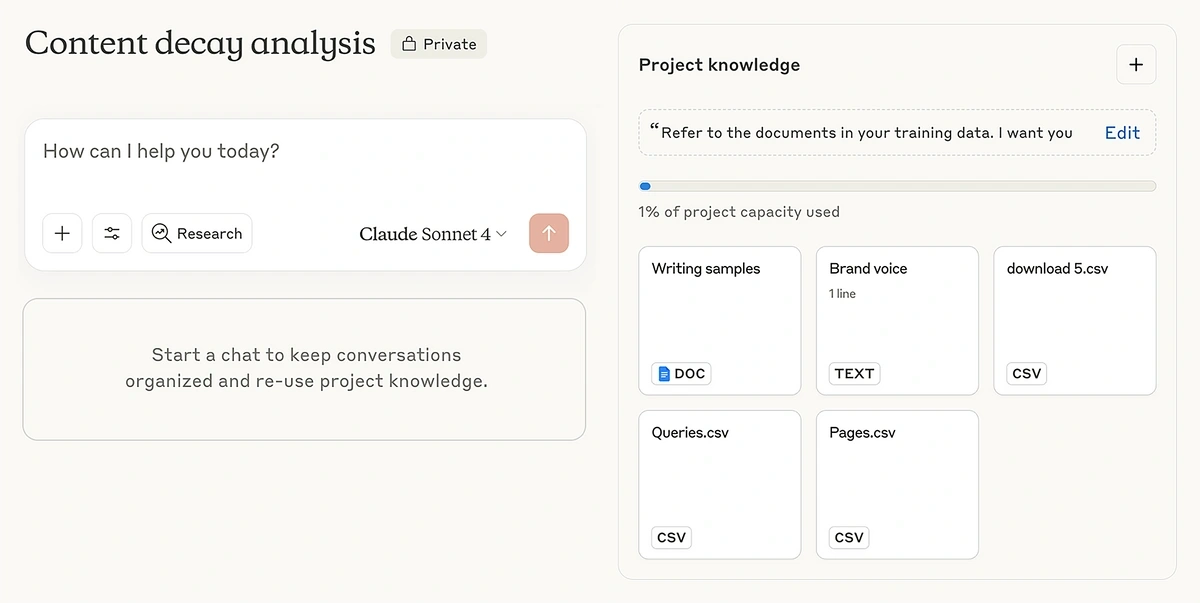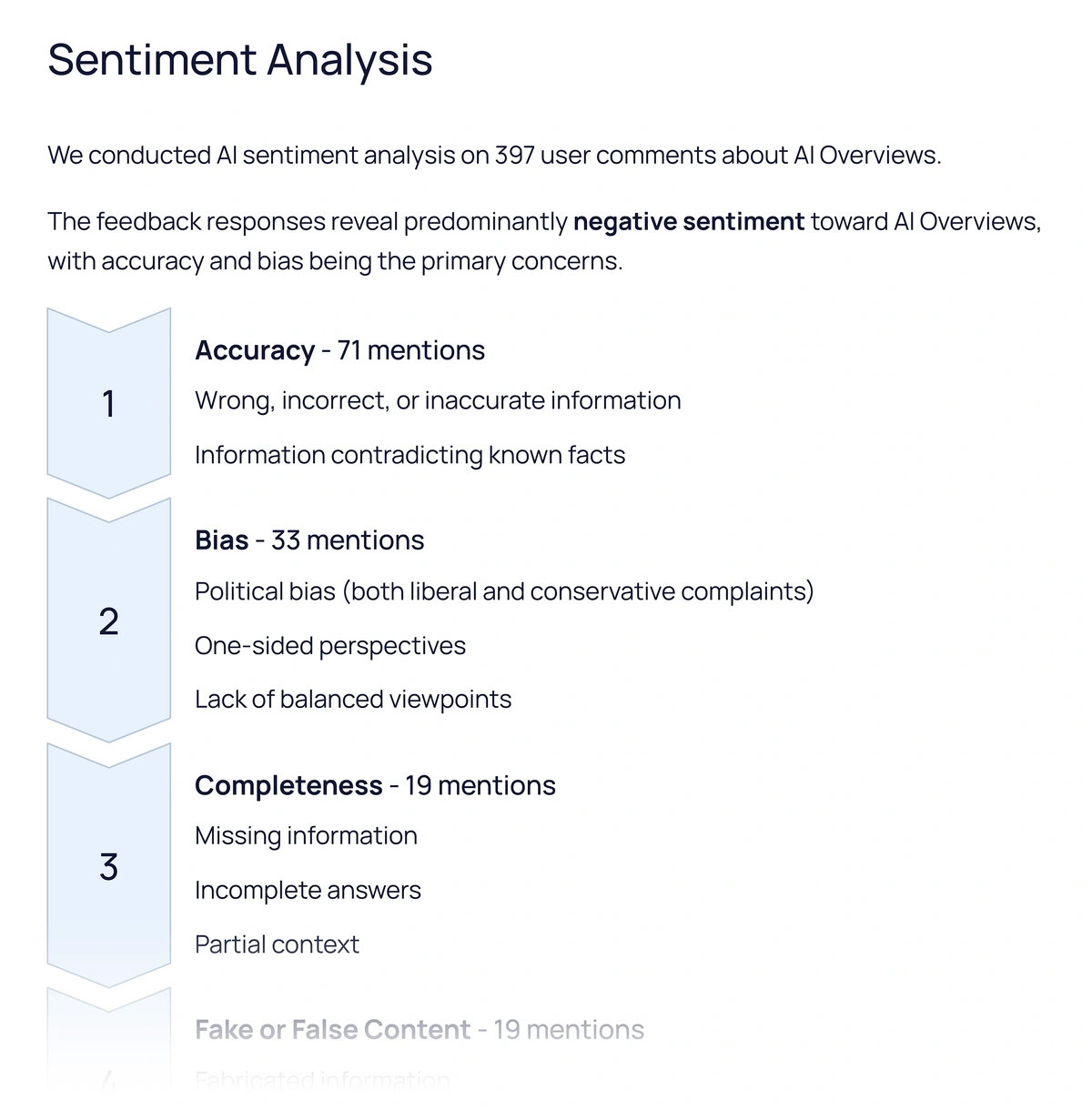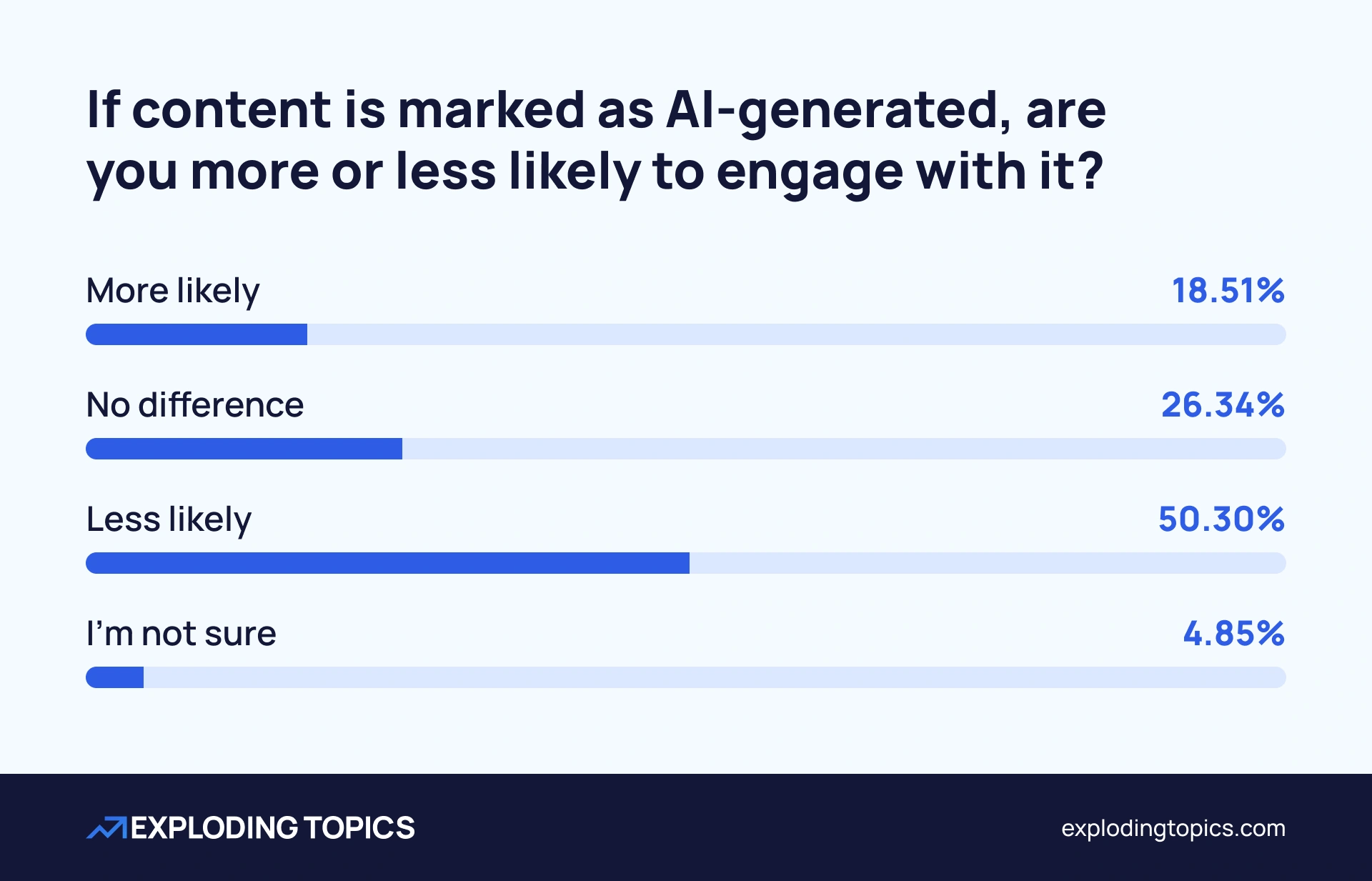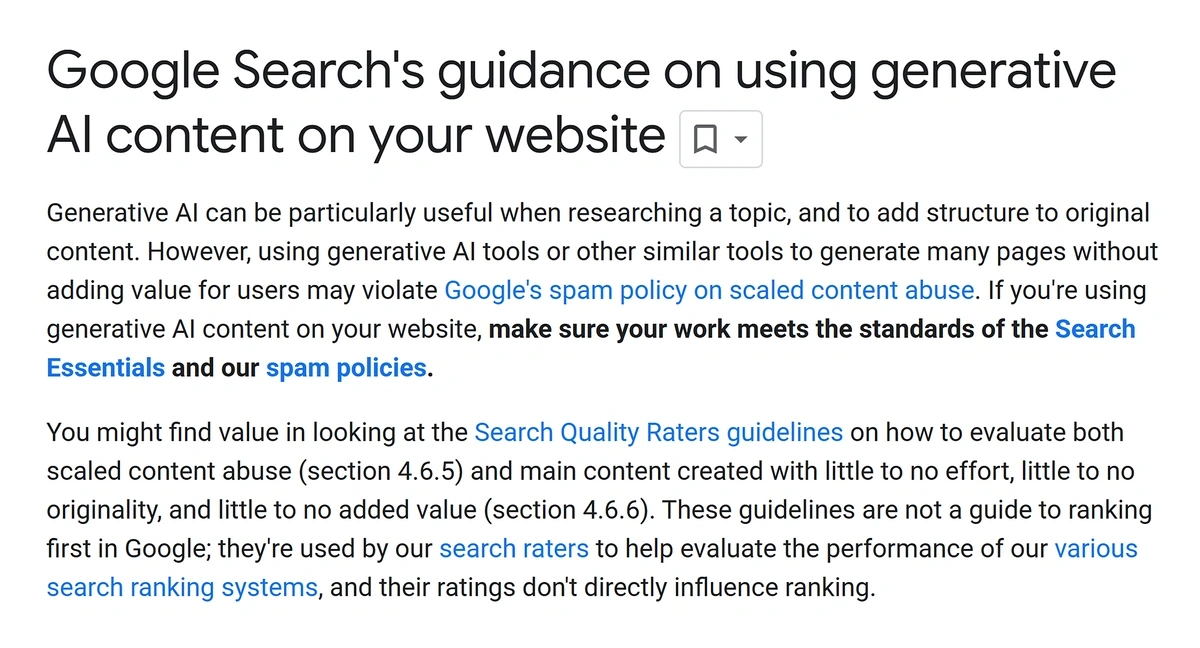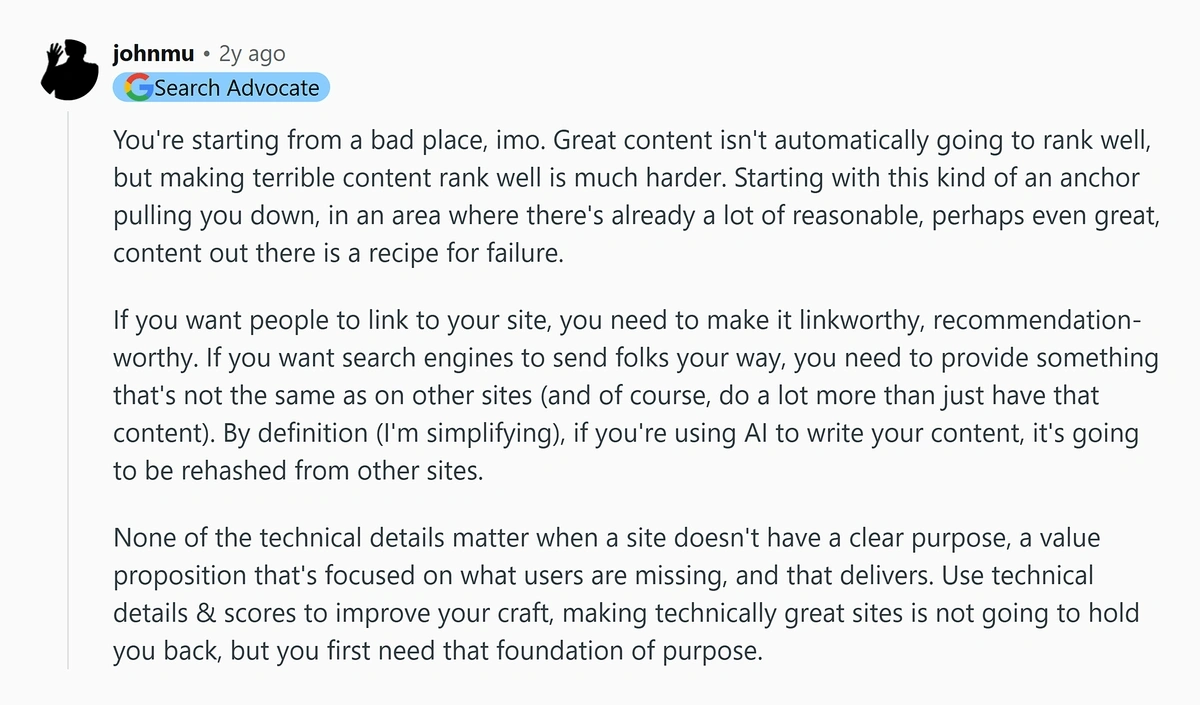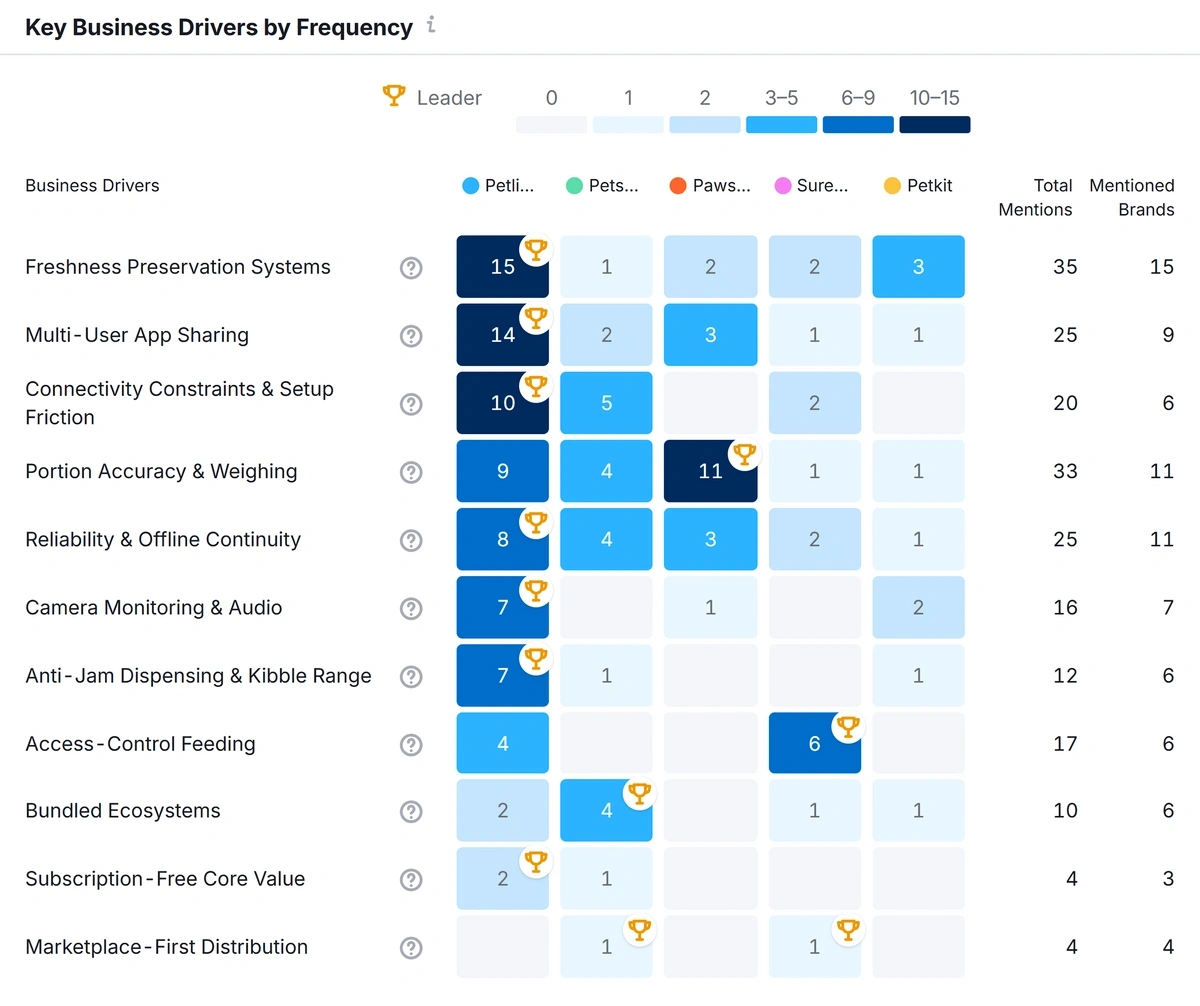Get Advanced Insights on Any Topic
Discover Trends 12+ Months Before Everyone Else
How We Find Trends Before They Take Off
Exploding Topics’ advanced algorithm monitors millions of unstructured data points to spot trends early on.

Keyword Research
Performance Tracking
Competitor Intelligence
Fix Your Site’s SEO Issues in 30 Seconds
Find technical issues blocking search visibility. Get prioritized, actionable fixes in seconds.
Powered by data from
Why Pure AI Content Won’t Win, And What SEO Teams Are Doing Instead
Mass-produced automated content is everywhere. It’s easy to see why.
LLM-generated content is easy, efficient, and inexpensive.
As with any new technology, we’re still exploring ways to extract the best value from LLMs.
For content creators and SEOs, this means top rankings, visibility, engagement, and conversions without the effort traditionally associated with obtaining these results.
But the evidence against the value of pure AI content is growing fast.
Instead, the initial excitement for AI-only workflows is getting replaced by a hybrid model—one that combines human expertise with AI efficiency.
When AI-Assisted Content Delivers Business Results
LLM-produced output shines in certain content/SEO use cases when used smartly.
I’ll focus on a few of these based on my experience and observations.
Content Production with Human Review and Editing
In my experience, AI’s content writing capabilities are at their best for short passages and rough drafts.
The SEO specialist Jessica Bowman talked about her process, which I think most good content marketers have also discovered for producing high-quality content:
“AI is terrible at producing longer content, but fabulous for inspiration pieces and shorter paragraphs or sections of an article. I tend to use AI to generate content section-by-section, and I get a few options. Then, I pick the best sentences/messages. Lastly, I string it all together and give a thorough edit so the sentences flow and the text isn't clunky. Simultaneously, I add in my tone of voice. In this way, AI content can work. BUT, it's not ready to write all your content yet. Writers need training on how to use vs. not use it.”
If you’ve ever tried producing a full article in a single go with any LLM, you probably know the results are usually quite derivative:
Generic content with a complete lack of original insights, fresh perspectives, and experiences that only an expert or practitioner could share.
In other words, it’s almost certain to be lacking all the factors that Google associates with high-quality content.
Teams that are successfully generating strong SEO outcomes using AI reveal a clear pattern:
They have a human element integrated into the process.
Matt Diggity thinks it’s a lie that AI-generated content can’t rank. But he clarified the critical role human experts play in his team to drive organic growth for his clients:
“2. AI content needs human expertise
We follow a 70/30 rule:
- 70% AI-generated base content
- 30% human expertise overlay (Or use a tool like SurferAI)
Add these human elements:
- Original data points
- Personal experiences
- Client case studies
- Industry insights only experts would know
3. First-hand experience matters more than ever
Google rewards content showing genuine expertise:
- Include specific details only practitioners would know
- Add screenshots of your own process
- Create custom visuals/diagrams
- Document your own tests and results”
The key takeaway is that, by all means, use AI for your content, but don’t skip human oversight and opportunities to inject originality.
Content Editing and Optimization
Another way to improve your content quality is by working with AI to self-edit and review your own draft.
AI tools like Claude and ChatGPT do a pretty good job of spotting issues like:
- Complex sentences and readability
- Topic coverage and depth
- Content flow between paragraphs and sections
- Repetition and keyword stuffing
LLMs can also help you update older articles and make edits for improved optimization.
Joli explained the process we use to apply context engineering when tackling content decay.
For example, attaching data from your GA4, Search Console, and reports from tools like Semrush AI Visibility Toolkit allows LLMs like Claude to craft tailored content.
It’s still essential to review the generated response before hitting publish. Even when you provide sufficient context, hallucinations are still very much possible in AI content.
Research and Data Analysis
One of the best ways to create original content and supply information gain is by referencing research you’ve conducted yourself.
And LLMs are excellent at analyzing spreadsheets of data (to an extent).
We provided data from our AI trust gap survey to Claude Sonnet 4 to interpret less obvious details, like participant sentiments toward AI Overviews.
This analysis was based on the language they used in the survey.
And we used AI tools to repurpose our article draft into a PDF format, which saved us hours of extra work.
This is an example of AI use that adds real value, not by eliminating the role of human experts but by speeding up research and multiplying production across formats in a strategic way.
Is AI-Generated Content Inherently Bad?
In the examples above, I have shown some of the ways that SEO teams are using a hybrid approach to produce high-quality content more efficiently.
But the question remains: does the provenance of a piece of content really impact business and marketing outcomes?
After all, AI-generated content isn’t technically prohibited by Google and other platforms.
To answer this question, I want to focus on two important facts.
Consumers Aren’t Entirely Enthusiastic About AI-Generated Content
Like most things in marketing, the ultimate test for AI content is whether consumers view it favorably.
There’s a fair bit of research showing consumer attitudes are skeptical at best toward AI-generated content.
In an MIT Sloan study from 2023, researchers found that people preferred AI content when they were unaware of its source.
But when people knew how the content was produced, they showed a clear bias toward human-created content.
This bias for human-written content remains unchanged even when people know that AI was involved in the process.
As long as it's clear that human experts contributed to the content in some way, consumers are likely to prefer it over exclusively AI content.
In other words, the AI-human collaboration is vindicated by customers, so there’s merit to workflows that combine both elements.
Other studies have also discovered similar attitudes.
Research by NIM discovered that labeling content as AI-generated makes people less likely to engage with marketing content and trust the messaging.
A recent Exploding Topics survey also confirms these research findings. As many as 50% of the 1,027 participants in our survey stated they’re less likely to engage with content labeled as AI-generated.
If we let consumers and their behavioral metrics like engagement and trust be the judge, the outlook for pure AI content isn’t promising.
Besides, it’s important to remember that ranking on search engines and LLM platforms is never the end goal.
No business derives any value from ranking content if it fails to win the audience’s trust.
On that note, it’s worth exploring another question: do Google and other platforms discourage AI content?
The High Risk of Generative AI Content Abuse
No search engine or social media platform outright prohibits the use of AI content.
But pure, unedited AI content produced at scale violates several content guidelines on search engines like Google and YouTube and even platforms like Wikipedia.
Google’s policy against scaled content is pretty clear on this:
The ability to scale content with AI means little when it comes with a big compromise in quality.
The only reliable way to ensure quality content? Include humans to review, edit, and add value to the finished content.
Because at best, unedited AI output is uninspiring and repetitive. And at worst, it’s plagued with hallucinations and falsehoods.
This is a crisis of credibility that Wikipedia is facing right now with AI-generated articles full of fake references.
The challenge for editors is even harder because AI is good at fabricating references that don’t exist: invalid ISBNs, fake web links, and random DOIs for hallucinated academic articles.
The problem got so bad that it led Wikipedia to publish a comprehensive document about telltale signs of AI writing to help editors identify it better.
Another major risk is that AI is an equalizer. Effective marketing is all about differentiation, not sameness.
Millions of people are using fundamentally the same AI models and the same prompts to generate content.
It’s not difficult to imagine a situation where competitors relying exclusively on AI end up with content that doesn’t leave much to set them apart.
Turn AI Mentions Into Your Next Strategic Move
Analyze how LLMs like ChatGPT feature your brand and get actionable recommendations to improve your business strategy, products, and market position.
Google’s John Muller said as much in a Reddit comment:
“... If you’re using AI to write your content, it’s going to be rehashed from other sites”.
Search engines are already aligned to reward original content characteristic of human subject matter experts.
For example, Google’s emphasis on E-E-A-T as a mark of quality content remains one of the strongest incentives against handing over complete control of your content to AI.
A similar stance is evident in YouTube’s updated content policies, threatening spammy, repetitive, and inauthentic content, such as that produced by AI channels, with demonetization.
These developments all point in the same direction: content production models that are automated throughout the entire process are a disaster waiting to happen.
And even if some SEO teams and content producers escape algorithmic guardrails against AI slop, there’s still the bigger challenge of satisfying user intent and winning their trust.
Given enough time, society is certain to catch up with AI clichés, repeated patterns, and unoriginal information.
Once that happens, content producers relying solely on AI will have to combat a new challenge in the form of AI blindness in customers, nosediving engagement.
In a sloppified web, uniqueness and originality derived from human authenticity will be your greatest marketing assets.
So is AI content inherently bad?
If it’s performing the entire function of your marketing team alone, the evidence indicates the answer is yes.
Bridge AI Efficiency with Human Expertise
At its core, blind automation is a shotgun approach that leaves no room for measurement, tracking, and pivoting strategically.
It’s not a sustainable approach for professional SEOs.
And it’s not how you can produce any results for something as tricky as LLM visibility.
Let me illustrate my point with an example.
The Semrush AI Visibility Toolkit gathers AI responses about your brand and shows you how you’re positioned in LLMs as compared to competitors.
These insights can shape your product development and enable you to align your marketing content with themes that are leading AI conversations in your industry.
You can only put these insights to good use by applying your expertise strategically with AI as your assistant.
For instance, using these insights, you can work with AI to:
- Analyze what makes a competitor’s content better suited for dominating AI mentions for certain themes using ChatGPT
- Discover topic gaps in your existing content with AI and apply your experience to optimize posts for improved AI visibility and mentions
- Identify opportunities for missing content clusters you can build to increase your share of voice in AI-based mentions.
You don’t need to swear by some magic process to find the ideal balance between AI efficiency and your human ingenuity.
The important thing is to use AI to your advantage where it makes sense, but have enough control in the workflow to produce high-quality content that readers want to engage with and trust.
Stop Guessing, Start Growing 🚀
Use real-time topic data to create content that resonates and brings results.
Exploding Topics is owned by Semrush. Our mission is to provide accurate data and expert insights on emerging trends. Unless otherwise noted, this page’s content was written by either an employee or a paid contractor of Semrush Inc.
Share
Newsletter Signup
By clicking “Subscribe” you agree to Semrush Privacy Policy and consent to Semrush using your contact data for newsletter purposes
Written By


Osama is an experienced writer and SEO strategist at Exploding Topics. He brings over 8 years of digital marketing experience, spe... Read more




